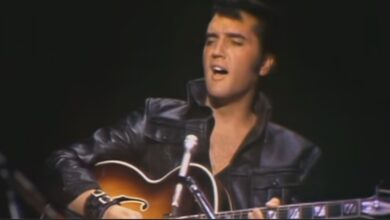Likely one of Elvis’ most powerful moments, the emotion in his voice is evident given the context
“If I Can Dream” is a profound and stirring song that stands as one of Elvis Presley’s most significant and memorable performances. Recorded in 1968, the song was the closing number of Presley’s celebrated television special, often referred to as the ’68 Comeback Special. This special marked a pivotal moment in Presley’s career, revitalizing his image and reasserting his status as a leading force in the music industry.
The inspiration behind “If I Can Dream” is deeply rooted in the social and political turmoil of the 1960s, particularly the tragic events of that year—the assassinations of Dr. Martin Luther King Jr. and Senator Robert F. Kennedy. The lyrics reflect a poignant response to these tragedies, expressing a longing for unity, peace, and a brighter future. The song’s opening lines, with their almost gospel-like quality, set a tone of hopeful yearning, suggesting a vision of a world where light and progress prevail over darkness and division.
Elvis Presley’s performance of “If I Can Dream” is marked by its emotional intensity and vocal prowess. His delivery, characterized by a powerful and heartfelt expression, underscores the song’s thematic depth. Presley’s voice conveys a profound sense of longing and optimism, making his performance both compelling and inspirational. The arrangement of the song complements his vocal performance with a rich orchestral backing that enhances the emotional impact of the lyrics.
The orchestral arrangement of “If I Can Dream” is notable for its lush and dramatic qualities. The arrangement includes a sweeping string section and a dynamic brass section, which together create a grand and uplifting sound. This musical backdrop supports Presley’s vocal performance, adding to the song’s sense of grandeur and urgency. The build-up to the song’s climactic chorus, where Presley’s voice reaches its full power, is particularly impactful, capturing the listener’s attention and driving home the song’s message.
The impact of “If I Can Dream” on Presley’s legacy cannot be overstated. Released towards the end of the 1960s, the song was one of the last major hits of Presley’s career before his death in 1977. It remains a significant part of his musical legacy, representing both his vocal talent and his ability to address important social issues through his music. The song’s enduring popularity is evidenced by its continued presence in popular culture and its frequent covers by other artists, including Celine Dion, Tom Jones, and Michael Bublé.
The song’s message of hope and unity continues to resonate with audiences today. Its relevance is underscored by its ability to inspire listeners across different generations, reflecting universal themes of aspiration and reconciliation. “If I Can Dream” remains a testament to Presley’s artistry and his capacity to connect with audiences on a deeply emotional level.
In addition to its musical and lyrical qualities, the song also highlights Presley’s versatility as an artist. Known primarily for his contributions to rock and roll, Presley’s foray into more socially conscious and emotionally charged material showcases his ability to adapt and address diverse themes. This aspect of his career adds depth to his overall legacy, demonstrating his range as a performer and his commitment to using his platform for meaningful expression.
Overall, “If I Can Dream” stands as a timeless classic, embodying the spirit of hope and the quest for a better world. Its powerful message, coupled with Elvis Presley’s exceptional performance, ensures that it remains an enduring and inspirational piece of music that continues to touch the hearts of listeners around the world.



